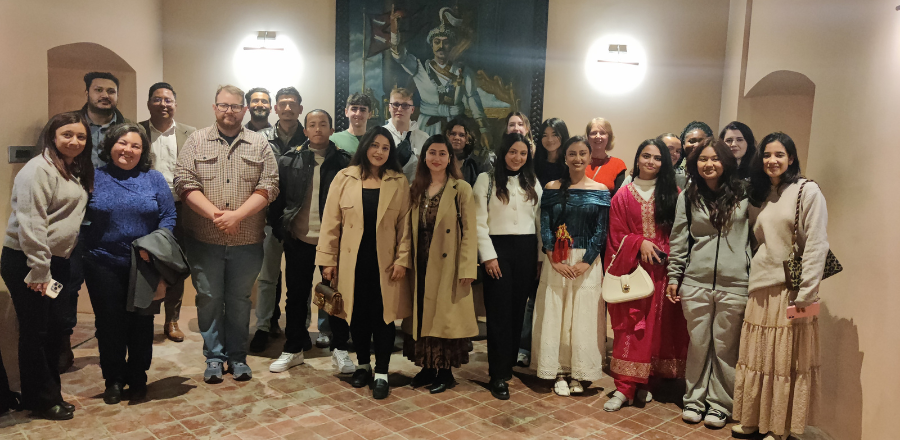Widening access students make a difference in Nepal

Nine students from Glasgow Caledonian University, all from widening participation backgrounds, recently took part in a life-changing international experience in Nepal, thanks to a Scottish Government-funded initiative.
As part of the Scottish Education Exchange Project, students from across the University’s three academic Schools spent five days in Kathmandu collaborating with peers from Ace International Business School (AIBS). The project saw students working on real-world, community-based challenges designed to develop global citizenship and address issues such as sustainability, health education and cultural preservation.
Students engaged in hands-on projects, aligned to the Sustainable Development Goals (SDGs), including educational outreach on menstrual health, digital storytelling for cultural heritage, and environmental sustainability through waste management and recycling. These activities were designed not only to build skills and confidence, but also to broaden perspectives through intercultural collaboration.
Three students each were selected from the School of Health and Life Sciences (SHLS), the Glasgow School for Business and Society (GSBS), and the School of Computing, Engineering and the Built Environment (SCEBE). The group included Ryan Banks (International Business Management), Alfie Jack (Audio Technology), Georgina Boyle (Social Work), Holly McGlone (International Tourism and Events Management), Yuliia Kuzmuk (Digital Design), and Roberta Oduro (Adult Nursing), among others.
They were accompanied by SHLS Senior Lecturer Anita Volkert and GSBS Marketing Lecturer Corrine Fenech. The trip was coordinated by Associate Deans International from all three Schools − Dr Karen Thomson (SHLS), Daniel Baxter (GSBS), and Charles Russell (SCEBE) − with vital support from the University’s International Partnerships Office.
This initiative supports Glasgow Caledonian’s mission to widen access and ensure that transformative learning opportunities are available to students from all backgrounds. With 22.1% of undergraduates coming from the most disadvantaged areas − surpassing the Scottish Government’s 20% target ahead of the 2030 deadline − the University is proud to lead in inclusive international education.
Dr Thomson said: “Education at Glasgow Caledonian is far deeper than what happens in the classroom. This Nepal trip is a shining example of how international experiences can be transformative. The personal growth we witnessed − from cultural awareness sessions pre-departure to reflective discussions upon return − was truly inspirational.”
Daniel Baxter added: “At Glasgow Caledonian University, we are committed to ensuring all students have access to life-changing global opportunities. This project has built confidence, cultural competency and a global mindset for our students. Access to funding like this is crucial for delivering equitable and impactful international experiences.”
Student feedback echoed the staff reflections.
Alfie Jack shared: “I worked on tourism and education projects focused on recycling and sustainability. Visiting a recycling centre and dismantling electronic waste gave us real insight into how these issues are tackled in Nepal. I’d highly recommend the experience − it’s an amazing country with some of the kindest people I’ve met.”
Georgina Boyle, who took part in a project on menstrual hygiene, said: “We worked with Nepali students to explore access to sanitary products and help break taboos. The highlight was connecting with everyone − from Glasgow Caledonian and Nepal. It was an unforgettable trip.”
